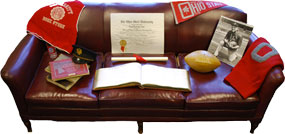(In celebration of the University Archives’ upcoming 50th Anniversary in 2015, we bring you “The Twelve Days of Buckeyes.” This is day 8 in a series of 12 blog posts highlighting the people who were instrumental in the creation and growth of the Archives.)
The University Archives was in its infancy when Robert W. Wagner became Chair of the Department of Photography and Cinema in 1966. But Wagner’s leadership in the development of using motion picture film as an effective tool in communication and teaching, would ultimately lead to enriching the Archives’ audiovisual collections to what they are today.
First, a little background: Wagner came to Ohio State as an undergraduate and received three degrees from the University: his bachelor’s in 1940, a master’s in 1941 and a PhD in 1953. He began his career at Ohio State in 1941, as an assistant in the former Bureau of Educational Research. He became a faculty member of photography in 1946, and then chaired the Department of Photography and Cinema from 1966 to 1974.
Wagner was noted as a “film-television educator whose contributions to curriculum, technique and professionalism have been recognized throughout the world.” Not only were hundreds of educational films – now housed in the Archives – produced under his chairmanship, Wagner also had an intense interest in the work archivists did in preserving photographs and motion picture film.
In 1968, Wagner presented a paper at a meeting of the Society of American Archivists regarding preservation concerns and dangers of nitrate-based films. (Nitrate film, produced from the 1880s to the 1950s on 35mm film, was made with a cellulose nitrate base, which is highly flammable and sometimes explosive under certain circumstances.)
“Today, at this moment, the record of a whole field of human effort is on fire: yet so few people are concerned that the remains are likely to crumble to a foul-smelling brown dust before the holocaust can be made public, let alone put out or even controlled….If we fail to plan for the future as well as the past, we shall perpetuate and accelerate the loss of our film and television heritage”.
Wagner’s compelling and persuasive presentation must have given archivists of the time a lot to think about.
Though his numerous achievements in teaching, film production and research throughout his career could have made for a comfortable retirement, Wagner’s story did not end there. Far from it.
Wagner gained the title of “emeritus professor” in 1984 and continued his quest of film education, believing that every film, video or photography studio or study center in major universities should include a course or seminar on the topic of the preservation of media. He pursued this topic, teaching film preservation workshops to graduate students and to librarians.
More than a decade after retirement, Wagner became a volunteer for the University Archives and the Byrd Polar Research Center Archival Program. He spent many hours hunched over a small manual film viewer, watching and describing early color film shot during Admiral Richard E. Byrd’s Expedition in Antarctica in the 1930s. Consequently, he later assisted the Polar Curator in secure a grant to preserve the expedition films.
He also worked with the University Archives’ collection of Photography and Cinema motion picture films, describing and transcribing them so that they would be more accessible to researchers. Working tirelessly to document the physical condition of the film in the Archives, he passed this information along to staff to continue the legacy. He also frequently served as the Archives’ consultant on audiovisual resources, and often visited the Archives to work with patrons interested in film.
On many occasions, Wagner served as mentor to Archives staff members, educating them on the identification, handling, and preservation of film. In a memorable display of hands-on teaching, he showed an Archives staff member how quickly a small piece of nitrate film could burst into flames (in the Archives parking lot, of course).
The Archives staff is eternally grateful for the contributions made from this great film pioneer. We leave you with one of his quotes:
“The worthy though unrewarding task is to protect and perpetuate our motion picture heritage – a form of human communication, creating expression and historic documentation so unique to the United States that cinema has almost become our second “language.” The job is to preserve this heritage on film, this visual literature for our time and for the future.” – Robert W. Wagner, The American Archivist, 1969
We could not have said it better.
Wagner died on February 7, 2011.
You can find several films from the Department of Photography and Cinema on the Libraries Knowledge Bank.






Recent Comments